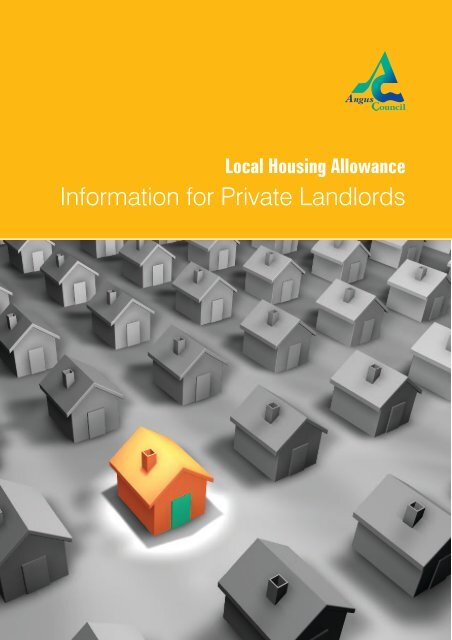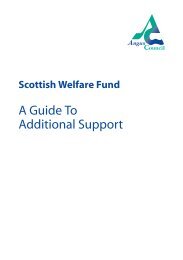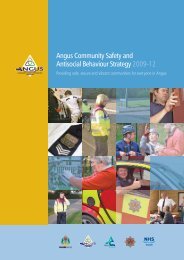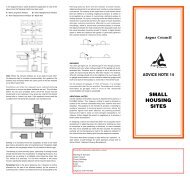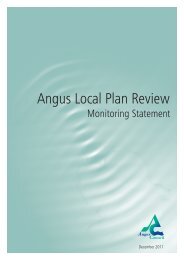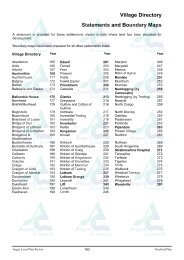Information for Private Landlords - Angus Council
Information for Private Landlords - Angus Council
Information for Private Landlords - Angus Council
You also want an ePaper? Increase the reach of your titles
YUMPU automatically turns print PDFs into web optimized ePapers that Google loves.
Local Housing Allowance<br />
<strong>In<strong>for</strong>mation</strong> <strong>for</strong> <strong>Private</strong> <strong>Landlords</strong>
What is Local Housing Allowance<br />
With effect from 7 April 2008, Local Housing Allowance<br />
is a new way of working out Housing Benefit <strong>for</strong> private<br />
tenants who are on a low income.<br />
Under Local Housing Allowance, benefit is not usually<br />
based on the property in which the tenant lives. It is<br />
based on:<br />
• who lives with the tenant<br />
• which area the property is in<br />
• how much money the tenant has coming in<br />
• what savings the tenant has.<br />
In some cases the amount of benefit will be affected by<br />
other things. These can include:<br />
• how much the rent is<br />
• whether anyone living with the tenant is expected to<br />
contribute to their rent.<br />
There is no change to the entitlement rules <strong>for</strong> Housing<br />
Benefit – these will still be based on a person’s income,<br />
savings and proof of rent etc.<br />
How do I find out what the Local Housing<br />
Allowance rates <strong>for</strong> my property will be<br />
We will publish the Local Housing Allowance rates<br />
every month on the <strong>Council</strong>’s website at<br />
www.angus.gov.uk. Alternatively you can contact the<br />
Revenues Service on 01382 535333.<br />
How does Local Housing Allowance affect landlords<br />
The only change <strong>for</strong> most landlords is that payment of<br />
benefit worked out using the Local Housing Allowance<br />
rates will normally be made direct to the tenant. The<br />
tenant will be responsible <strong>for</strong> paying their rent to the<br />
landlord.<br />
1
Which landlords does Local<br />
Housing Allowance affect<br />
Local Housing Allowance affects any landlord who<br />
enters into a deregulated private tenancy agreement<br />
with a person awarded Housing Benefit. By<br />
deregulated, we mean a tenancy that has been entered<br />
into since 1989 and is not covered by one of the<br />
exceptions listed below.<br />
Who is not affected by Local Housing Allowance<br />
Local Housing Allowance does not affect:<br />
• local authority landlords who let to ‘council tenants’<br />
• tenancies with registered social landlords<br />
• some supported housing<br />
• tenancies which started be<strong>for</strong>e 2 January 1989<br />
• tenancies in caravans, houseboats or hostels<br />
• tenancies where the Rent Officer has decided that a<br />
substantial part of the rent is <strong>for</strong> board and<br />
attendance<br />
Why has Local Housing Allowance<br />
been introduced<br />
Local Housing Allowance has been introduced to<br />
increase responsibility, place choice firmly in the hands<br />
of tenants and help develop their skills to make the<br />
transition into work. The objectives of introducing Local<br />
Housing Allowance are:<br />
Fairness – to pay similar amounts to tenants with<br />
similar circumstances.<br />
Choice – to allow tenants to choose between price and<br />
quality of accommodation.<br />
Transparency – it is easier <strong>for</strong> tenants (be<strong>for</strong>e they<br />
commit themselves to a property) and landlords to find<br />
out how much rent could be covered by Housing Benefit.<br />
2
Personal responsibility – making tenants take<br />
responsibility <strong>for</strong> budgeting <strong>for</strong>, and paying, their own<br />
rent.<br />
Financial inclusion – to encourage tenants to have<br />
their housing payments paid into a bank account and<br />
set up a standing order to pay the rent to their landlord.<br />
Improved administration and reduced barriers<br />
to work – a simpler system helps to speed up the<br />
administration of housing payments giving tenants<br />
more confidence when starting a job that any in-work<br />
benefit will be paid quickly.<br />
What if the rent is not the same as the Local<br />
Housing Allowance rate that applies to my tenant<br />
A tenant’s maximum Housing Benefit will be based on<br />
the Local Housing Allowance rate that they are entitled<br />
to. This avoids the need <strong>for</strong> Rent Officers to examine<br />
every property and decide what level of rent is eligible<br />
<strong>for</strong> Housing Benefit in each case.<br />
Tenants who are looking <strong>for</strong> somewhere to rent can<br />
choose to;<br />
• rent a property where the rent is the same as the<br />
Local Housing Allowance rate they are entitled to<br />
• pay more than the Local Housing Allowance rate<br />
they are entitled to and rent a more expensive<br />
property using the money they have coming in<br />
• pay less than the Local Housing Allowance rate they<br />
are entitled to and rent a less expensive home. In<br />
this case they will be able to keep the difference<br />
between the rent and the Local Housing Allowance<br />
up to a maximum of £15 per week.<br />
Why will payment be made to the tenant<br />
Tenants who get benefit calculated using the Local<br />
Housing Allowance rates should be able to take greater<br />
responsibility <strong>for</strong> managing their financial affairs and<br />
3
paying their rent to their landlords, in the same way as<br />
other tenants do. This is why any benefit will usually be<br />
paid to the tenant and not to the landlord.<br />
The right of the tenant to ask <strong>for</strong> Housing Benefit to be<br />
paid direct to their landlord has been removed under<br />
Local Housing Allowance rules.<br />
I already receive direct payment <strong>for</strong> some of<br />
my tenants. Will these payments stop<br />
No. If you were receiving Housing Benefit payments<br />
be<strong>for</strong>e 7 April 2008 on behalf of your tenant(s), these<br />
will continue to be paid to you until there is a relevant<br />
change of circumstances (see below).<br />
The Local Housing Allowance rules will only affect any<br />
tenants who on or after 7 April 2008 make a new claim,<br />
move address to new privately rented accommodation<br />
or have a break in their claim, of a week or more.<br />
If you are a landlord who owns or manages a number<br />
of properties, you may find that you have tenants who<br />
are getting Housing Benefit that we pay you direct<br />
(under pre-LHA rules) and other tenants getting<br />
Housing Benefit calculated using the Local Housing<br />
Allowance rates who will pay you themselves.<br />
What protection exists <strong>for</strong> landlords<br />
<strong>Angus</strong> <strong>Council</strong> has a safeguard policy in place to<br />
protect the interests of both tenants and landlords.<br />
Payment may be made direct to the landlord where we<br />
decide that the tenant is:<br />
• likely to have difficulty in managing their financial<br />
affairs or<br />
• unlikely to pay their rent<br />
We can also decide to pay benefit to the landlord if,<br />
during the current claim to benefit, the tenant is in<br />
arrears with their rent.<br />
4
There is no change to the existing rule that if your<br />
tenant is eight weeks or more in arrears with their rent<br />
then the local authority should make payment direct to<br />
the landlord unless it is not in the best interests of the<br />
tenant to do so.<br />
If your tenant falls behind with their rent please<br />
telephone 01382 535333 and ask to speak to the LHA<br />
Liaison Officer. They will discuss the matter with you<br />
and offer advice on the safeguard policy. We will usually<br />
issue you with a <strong>for</strong>m to complete which will help us to<br />
make a decision on who to pay. The <strong>Council</strong>’s<br />
safeguard policy is available on the <strong>Council</strong>’s website at<br />
www.angus.gov.uk where <strong>for</strong>ms to request that your<br />
tenants Housing Benefit be paid to you under the<br />
safeguard policy can also be downloaded.<br />
Who decides if a tenant is likely to<br />
have difficulty in paying their rent<br />
We will decide whether a tenant is likely to have<br />
difficulty in paying their rent. Evidence will be required<br />
to support a request, which can be made by the tenant<br />
or other interested party.<br />
You, as a landlord, can approach us if you think it likely<br />
that your tenant will have difficulty in paying or you feel<br />
they cannot deal with their financial affairs. We will<br />
contact your tenant <strong>for</strong> further in<strong>for</strong>mation regarding<br />
this.<br />
We will also decide whether a tenant is unlikely to pay<br />
their rent. We can only do this if we have evidence of<br />
past, or likely, failure to pay rent. We will take into<br />
account all knowledge and evidence available to us at<br />
the time, including any known past history when<br />
making our decision.<br />
It will also be important <strong>for</strong> the landlord to keep proper<br />
and adequate records of rent payments received and<br />
details of any contact made with the tenant.<br />
5
Can the tenant ask <strong>for</strong> their benefit<br />
to be paid to their landlord<br />
As part of the Local Housing Allowance scheme tenants<br />
can no longer simply ask <strong>for</strong> their benefit to be paid direct<br />
to their landlord. If a tenant feels that they may have<br />
difficulty in managing their financial affairs they can apply<br />
under the safeguard policy to have direct payment made<br />
to their landlord, we will consider any request they make.<br />
Where direct payments are made to me,<br />
how long will they go on <strong>for</strong><br />
Where a tenant is considered likely to have difficulty in<br />
paying their rent and there is little or no prospect of<br />
their situation changing, payment of benefit to the<br />
landlord is likely to be long-term.<br />
In cases where the situation is likely to be temporary, or<br />
where rent arrears of more than eight weeks have been<br />
repaid, the situation will be reviewed. If the tenant is in a<br />
better position to have their benefit paid to themselves,<br />
and to pay their rent in full and on time, direct payments<br />
to the landlord will stop.<br />
Won’t tenants spend their Local Housing<br />
Allowance on other things<br />
Many tenants in the private rented sector get their<br />
Housing Benefit paid to them and regularly pay their<br />
rent on time. However, there will be some customers<br />
who can’t manage their own rent payments and the<br />
safeguard policy is designed to stop these customers<br />
falling into unmanageable difficulties.<br />
Won’t this discourage landlords from letting their<br />
properties to Housing Benefit claimants<br />
The Local Housing Allowance scheme has positives <strong>for</strong><br />
both landlords and tenants.<br />
It is intended to help landlords, as well as tenants, by<br />
creating a more transparent system that is simpler to<br />
6
understand and administer. Overall, it will support and<br />
clarify the relationships between the local authority,<br />
tenants and landlords.<br />
<strong>Landlords</strong> will still be able to approach us <strong>for</strong> help with<br />
rent arrears <strong>for</strong> tenants getting their benefit calculated<br />
using the Local Housing Allowance rules. They cannot<br />
do this where they have a tenant in rent arrears who is<br />
not getting benefit.<br />
Because payments are going to tenants in most cases,<br />
this removes the possibility of landlords being asked to<br />
repay large amounts in overpaid benefit. Under the<br />
Local Housing Allowance scheme it is unlikely that we<br />
would ask you to repay any money that your tenant has<br />
paid directly to you.<br />
We believe that the safeguards that exist regarding<br />
direct payment to landlords strike the right balance in<br />
protecting the interests of both landlord and tenant.<br />
Can I make direct payment a<br />
condition of the tenancy<br />
The local authority is not party to the tenancy agreement<br />
between a landlord and tenant, and we are not bound<br />
by any conditions in a tenancy agreement. We cannot<br />
pay benefit to a landlord directly at the tenant’s request<br />
– the rules about when we can pay the landlord directly<br />
are outlined above. You cannot change this by making<br />
direct payment a condition of the tenancy.<br />
What appeal rights do I have against<br />
a payment decision<br />
Appeal rights are not changing as a result of the new<br />
scheme. You will still have the right to appeal a decision<br />
by the authority not to make direct payments.<br />
Translation Service<br />
<strong>Angus</strong> <strong>Council</strong> aims to provide access to in<strong>for</strong>mation<br />
about services to all its customers. This leaflet can be<br />
7
translated into Chinese, Urdu, Hindi, Punjabi or Gaelic,<br />
or can be made available in large print, audio or Braille.<br />
If you require this service please contact the <strong>Council</strong>’s<br />
ACCESSline on 08452 777778.<br />
Who to contact <strong>for</strong> further in<strong>for</strong>mation<br />
Should you need any assistance or require any further<br />
in<strong>for</strong>mation about any of the points in this leaflet please<br />
telephone the LHA Liaison Officer on 01382 535333.<br />
Remember that this leaflet is a general guide only and<br />
is not a full and authoritative statement of the law. We<br />
have made every ef<strong>for</strong>t to ensure that the in<strong>for</strong>mation in<br />
this leaflet is correct at the date shown on the cover.<br />
8
Version 1: March 2008


